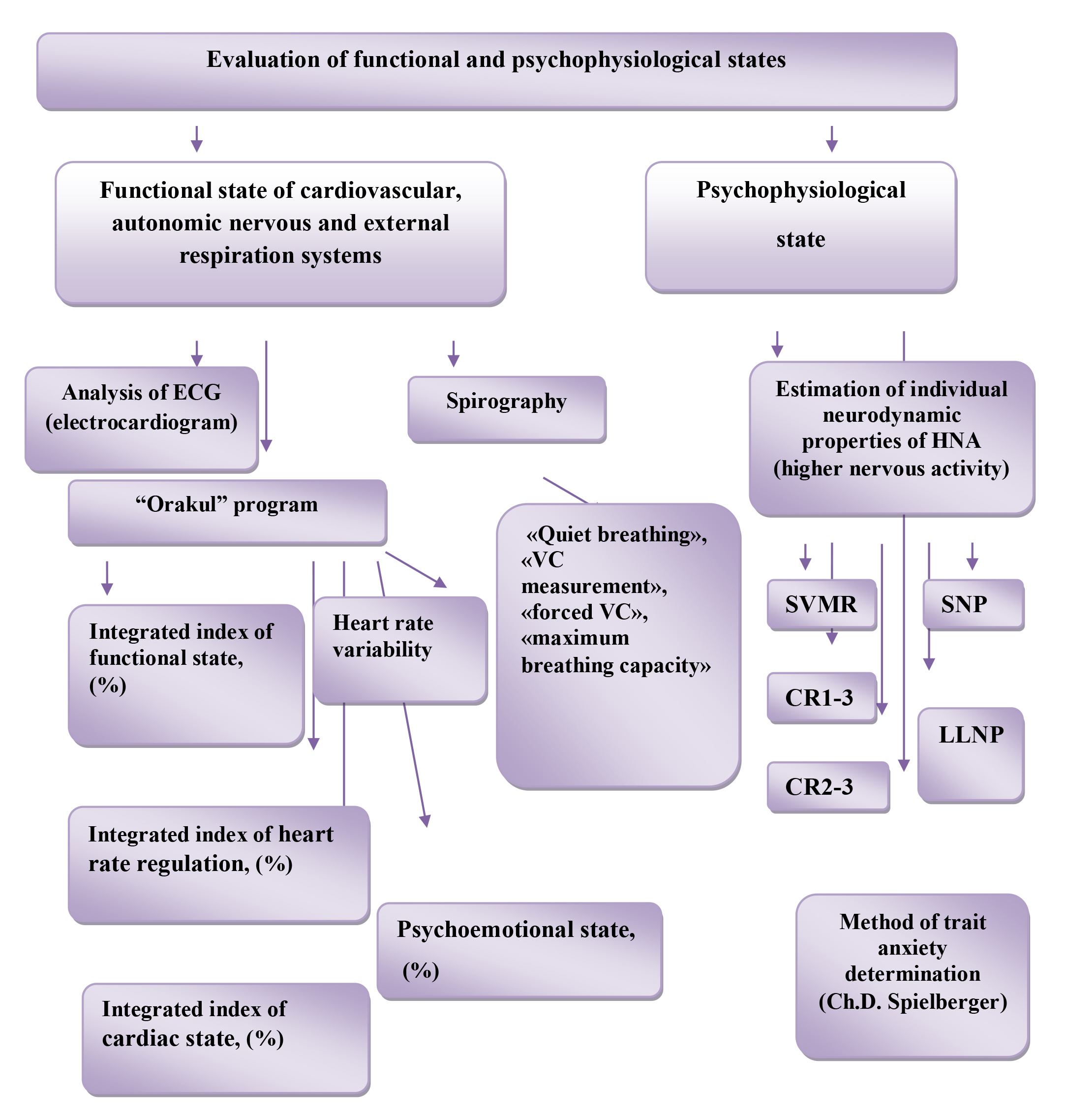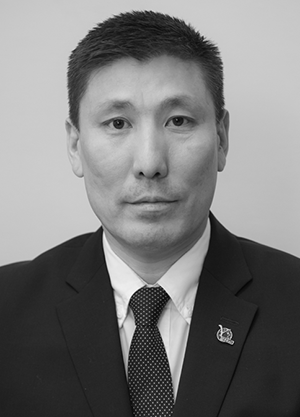Methodological support of training of sports reserve of Republic of Sakha (Yakutia)
Фотографии:
ˑ:
Dr.Hab., Professor I.A. Cherkashin
Ph.D., Associate Professor E.V. Krivoruchenko
S.P. Skryabin
P.P. Okhlopkov
Institute of Physical Culture and Sport of North-Eastern Federal University named after M.K. Ammosov, Yakutsk
Key words: methodological support, sports reserve, physical fitness control.
Introduction. Sports schools (Youth Sports Schools, Specialized Children and Youth Sports School of Olympic Reserve, Olympic Reserve Academy, Elite Sports Mastery Schools) play the main role in reserve training system and their goals are to train active and immediate reserve athletes for the national teams of the Russian Federation, strengthen health and ensure harmonious physical development of youth [3]. Sports results are achieved at the limit of functional capabilities of the human body, therefore, further sports development without health damage to the younger generation is impossible without sports science. Development of methodological support (MS) system of sports reserve training makes it possible to prolong sports longevity and preserve health of young athletes. A significant element in managing the sports reserve training is MS system, which helps evaluate effectiveness of selected direction of training process. As the objects of control, specialists distinguish such characteristics as efficiency of competitive activity, development level of motor qualities, technical-tactical skills, mental and integral fitness; load indices for particular exercises, training sessions, micro-, meso- and macrocycles etc.; capabilities of individual functional systems and mechanisms, ensuring efficient competitive activity; body response to suggested training loads, specifics of fatigue and recovery processes [5].
Problems of athletes’ training and control of training process (planning of training and competitive loads and their timely correction), which is carried out on the basis of integrated control, cannot be settled successfully without knowing the body’s biological responses to given training loads. Hence, the integrated control involves the methods of sports physiology, sports biomechanics, sports psychology and other scientific disciplines, integrated by means of various mathematical methods of processing of the obtained data [6]. The purpose of methodological support of the sports reserve training in the Republic of Sakha (Yakutia) is practical implementation in the training process of the latest achievements in sports science, international experience and latest achievements in science and technology; scientific substantiation of the organization and methodological concept of training in youth sport; development of recommendations and their practical use in training and competitive activities of the athletes.
The purpose of the study was to improve the system of methodological support of the sports reserve training in the Republic of Sakha (Yakutia) based on the development of methods of estimation of physical fitness, functional and psychophysiological states of the athletes.
Materials and methods. In the course of the study, we considered the basic conditions ensuring success in functioning of reserve training system in Republican Specialized Children and Youth Sports School. We analyzed statistical data, standard statutes, programs, regulatory documents of sports organizations. We carried out the analysis and compilation of the data on theoretical and methodological support of training of national teams, which have the best Olympic achievements for the last two decades.
Results and discussion. The TMS tasks are as follows: conducting of integrated control, which involves evaluation of each component of training and competitive activities of the athletes; sports results; functional state; level of general and special physical fitness, technical-tactical and mental fitness of the athletes. Basic forms of the integrated control of young athletes’ state include: integrated in-depth examination (IIE); integrated phased examination (IPE); current examination (CE); operational examination (OE); examination of competitive activity (ECA).
The following two directions determine the process of examination of the reserve athletes in the Republic of Sakha (Yakutia): estimation of physical fitness and assessment of functional and psychophysiological states of young athletes. Technology of evaluation of young athletes’ physical fitness involves pedagogical testing, which helps determine the level of development and display of motor qualities, as well as assessment criteria, represented in the form of rating scales and the degree of physical fitness of the maximum possible in percentage form. The application of the methodology of evaluation of athletes’ physical fitness helps make a comprehensive assessment of an athlete – to determine the level of display and development of speed, speed-strength, strength, coordination abilities, special endurance, intermuscular and intramuscular coordination by means of available informative tests, as well as carpal dynamometry. The number of exercises depends on a particular sport and specialization, regardless of athletes’ skills. In addition to estimation of the level of physical abilities, we can define a predisposition of an athlete to a particular sport and specialization, forecast successful performance in the up-coming competitions, identify the leaders, and on this basis, staff the teams for participation in the competitions of various levels [1, 2].
Athletes’ functional state, comprising the estimation of cardiovascular, autonomic nervous and external respiration systems, is evaluated with the help of the diagnostic automated complex “Cardio+”. The estimation of psychophysiological state was made using the “Diagnost-1” software, including determination of the indicators of latent periods of simple and complex visual-motor reactions (choice of one or two signals out of three), error rate during information processing, lability level of nervous processes, strength of nervous processes (Fig.1).

Fig.1. The diagram of evaluation method of functional and psychophysiological states of the reserve athletes of the Republic of Sakha (Yakutia): SVMR - simple visual-motor reaction, CR1-3 – choice reaction of one signal out of three, CR2-3 - choice reaction of two signals out of three, LLNP - lability level of nervous processes, SNP - strength of nervous processes.
The objective of integrated control implementation was to obtain complete information on fitness level of the sports reserve of the Republic of Sakha (Yakutia) in order to make the training process more effective. The following tasks are stipulated when realizing TMS measures:
- forecasting of sports results, performances of reserve teams in the competitions of various levels;
- simulation of various aspects of young athletes’ fitness (technical-tactical, physical, functional and mental);
- improvement of qualification system for the national teams of the Republic of Sakha (Yakutia) in different sports;
- planning of structural formations of the training process (macro-, meso- and microcycles);
- realization of operational, current and phased control of the efficiency of adaptive response to training and competitive loads aimed at correction and enhancement of training process;
- implementation of non-training and non-competitive factors (means for recovery and enhancement of working capacity, rational nutrition; anti-doping measures; injury prevention etc.) [4].
Conclusion. It should be noted that the organizational system of methodological support of the sports reserve can be effective only with due regard for age and qualification peculiarities of the contingent as long as the tools and methods of control correspond to the specifics of the particular sport.
Summing up the results of the study, we can conclude that the development of the methodological support of the training of the sports reserve athletes in the Sakha Republic (Yakutia) will help: determine the level of general and special physical fitness; define a predisposition of a particular athlete to chosen sport; predict competitive performance, duration and successful performance throughout sports career; identify the early stages of the longterm training of "leaders" among athletes, who can achieve outstanding results and maintain this level in subsequent phases; make adjustments to the organization of training sessions and training plans; improve the training system of the reserve teams of the Republic of Sakha (Yakutia); enhance the system of qualification of athletes to the reserve national team of the Republic of Sakha (Yakutia).
References
- Bobrovnik, V.I. Tekhnologiya otsenki fizicheskogo sostoyaniya kvalifitsirovannykh sportsmenov na etape podgotovki k vysshim dostizheniyam (Physical condition evaluation technology for skilled athletes at elite training phase) / V.I. Bobrovnik, E.V. Krivoruchenko // Nauka v olimpiyskom sporte. – 2010. – № 1–2.– P. 47–55.
- Krivoruchenko, O.V. Metodika otsіnki fіzichnogo stanu sportsmenіv rіznoy kvalіfіkatsії, yakі spetsalіzuyut'sya z bіgu na korotkі і serednі distantsії (Physical condition evaluation technology for athletes of different skill levels, specializing in women's sprint and middle distance running) / O.V. Krivoruchenko // Pedagogics, psychology, medicobiological problems of physical education and sport: scient. monograph / Ed. by S.S. Ermakov – Kharkіv: KhDADM (KhKhPІ), 2012. – № 5. – P. 83–85.
- Nikitushkin, V.G. Mnogoletnyaya podgotovka yunykh sportsmenov (Long-term training of junior athletes) / V.G. Nikitushkin. – Moscow: Fizicheskaya kul'tura, 2010. – 240 P.
- Platonov, V.N. Sistema podgotovki natsional'noy komandy Ukrainy k Igram XXX Olimpiady 2012 g. v Londone (Training system of the national team of Ukraine for the XXX Olympic Games 2012 in London) / V.N. Platonov // Nauka v olimpiyskom sporte. – 2009. − № 1. – P. 198–218.
- Udodova, E.K. Nauchno-metodicheskoe obespechenie paralimpiyskoy zhenskoy sbornoy Rossii po golbolu (Methodological support of Paralympic women's national team of Russia) / E.K. Udodova, A.V. Ivanov, A.A. Baryaev, O.P. Kudinova // Adaptivnaya fizicheskaya kul'tura. – 2013. – № 1 (53). – P. 35–36.
- Fomichenko, T.G. Sovremennye podkhody k sovershenstvovaniyu sistemy nauchno-metodicheskogo obespecheniya podgotovki sportivnykh sbornykh komand Rossii (Modern approaches to improvement of methodological support of training of Russia's national teams) / T.G. Fomichenko, M.P. Shestakov, A.G. Abalyan // Vestnik sportivnoy nauki. – 2010. – Iss. 5. – P. 3–6.
Corresponding author: 706037@mail.ru



 Журнал "THEORY AND PRACTICE
Журнал "THEORY AND PRACTICE